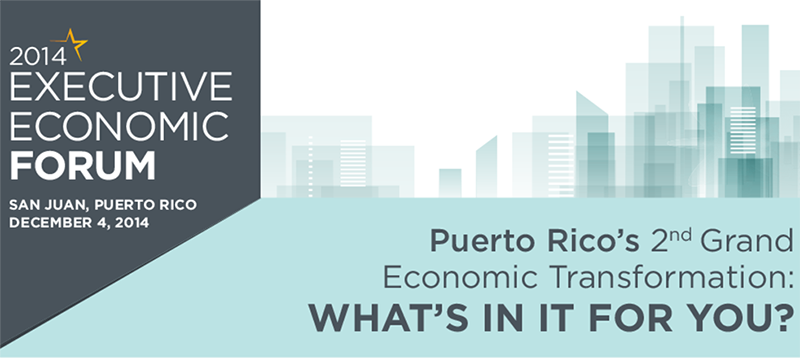Executive Economic Forum – 2014 › San Juan, Puerto Rico
Executive Economic Forum – 2014 » San Juan, Puerto Rico
December, o4 @ the Ritz Carlton, Isla Verde
Have you tapped into the new opportunities for business
and individuals that early adopters of
Acts 20 and 22 are creating?
 Are you part of the economic transformation,
Are you part of the economic transformation, or stuck in your comfort zone? How can government and businesses work together to
improve long-term competitiveness and generate employment? What steps are you taking to boost growth and evolve positively? This one-day Forum, held in collaboration with the
Department of Economic Development and Commerce,
will join high level government officials, business owners, industry
leaders and entrepreneurs to discuss the challenges Puerto Rico
faces and the opportunities being created as it moves
into a new economy.
LEARN ABOUT:
- New Financial Alternatives: From EB5 to Market Tax Credits
- Act 20: Business Opportunities for Local Entrepreneurs, a panel of successful early adopters will share experiences
- Networking with New Market Segments: Aerospace – Where are the Opportunities
- Business Turnaround: Is it Time to Adapt and Change, Top USA restructuring firms will discuss approaches for private sector transitioning and refocusing
• Service Providers • Top managers looking to transform and take
advantage of all the opportunities being created by this new
economic transformation Register for the Executive Economic Forum here: www.preconomicforum.com/registration Download the Forum Schedule (PDF) here: preconomicforum.com/schedule (Source: www.preconomicforum.com)
Learn More about Puerto Rico Tax Incentives
Puerto Rico, officially the Commonwealth of Puerto Rico, is a self- governing, territory of the United States, located in the northeastern Caribbean, east of the Dominican Republic and west of both the US Virgin Islands and the British Virgin Islands.
The government of Puerto Rico is composed of three branches: the executive, legislative, and judicial branch. The executive branch is headed by the governor. The legislative branch consists of a Legislative Assembly, made up of a Senate as its upper chamber and a House of Representatives as its lower chamber. The Senate is headed by the President of the Senate, while the House of Representatives is headed by the Speaker of the House. The governor and legislators are elected by popular vote every four years.
Puerto Rico has authority over its internal affairs unless US law is involved. The major differences between Puerto Rico and the 50 states are exemptions from some aspects of the Internal Revenue Code, its lack of voting representation, and the ineligibility of Puerto Ricans to vote in presidential elections.
The island is divided into 78 municipalities (counties/cities) with various degrees of autonomy from the central government. San Juan is the capital and most populated municipality, combined with nine other municipalities which form the San Juan Metropolitan Area. Within the 78 municipalities, 4 are considered major cities.
The island has been part of the U.S. since 1898 and those born in Puerto Rico have been citizens of the U.S. since 1917. Yet, because Puerto Rico is not a state, federal taxes do not apply generally to income generated by individuals or corporations within the Commonwealth. Puerto Rico corporations are treated for federal tax purposes as foreign corporations and are not generally subject to U.S. corporate taxes. Individual bona-fide residents of Puerto Rico are not subject to federal taxes on income derived from Puerto Rico sources. In addition, Puerto Rico has provided incentives for manufacturing operations for over four decades. Products manufactured in Puerto Rico will carry the Made in USA label.
In 2008, a new Economic Incentives Act for the Development of Puerto Rico (herein after, Act 73 or Economic Incentives Act) went into effect. Also during the year 2012, two additional laws were enacted: Act 20 and Act 22, promoting the export of services from Puerto Rico and the transfer of wealthy individuals to Puerto Rico. These new laws established a legal framework of incentives designed to stimulate the establishment and development of a wide array of ventures, among them manufacturing, social media, other internet-based operations, commercial businesses, and the export of services.
Contact us for an introduction to a top Puerto Rico Tax Consultant, who will guide you through the incentives applicable to your company.
To help you navigate this section, to your left are brief overviews of Puerto Rico’s Tax Incentives.
Act No. 20 of 2012, known as the Act to promote the exportation of services, provides attractive tax incentives for companies that establish and expand their export services businesses in the island.
In addition, the law promotes investments on research and development and initiatives from the academic and private sectors by granting credits and exemptions for these activities. Furthermore, it helps to decrease operational and energy spending for companies moving to the island in order to help their operations remain profitable and efficient.
Act No. 22 of 2012, Seeks to attract new residents to Puerto Rico by providing a total exemption from Puerto Rico income taxes on all passive income realized or accrued after such individuals become bona fide residents of Puerto Rico. This relocation should result in new local investments in real estate, services and other consumption products, and in capital injections to the Puerto Rico banking sector, all of which will accelerate the economy of the island.
Act 73 › Economic Incentives for the Development of Puerto Rico
Act No. 73 of 2008, known as the Economic Incentives Act for the Development of Puerto Rico, was established to provide the adequate environment and opportunities to continue developing a local industry, offer an attractive tax proposal, attract direct foreign investment and promote economic development and social betterment in Puerto Rico.
Act – 273 › International Financial Center Regulatory Act
On September 25, 2012 (“Act 273”), Puerto Rico enacted Act No. 273, also known as the “International Financial Center Regulatory Act” (the “Act”). The Act provides tax exemptions to businesses engaged in eligible activities in Puerto Rico. To avail from such benefits, a business needs to become an International Financial Entity (“IFE”) by applying for a permit and license and obtaining a tax exemption decree.
EB5 › Immigrant Investor Program
The U.S. Congress created the fifth-employment based (EB-5) immigrant visa category in 1990 for the qualified foreigner willing to invest in a business that will benefit the U.S. economy and create or save at least 10 full-time jobs.
The investment requirement is typically US $1,000,000 per foreign investor. A minimum investment of US $500,000 is accepted if the investment is made in a designated Target Employment Area, such as a rural or high unemployment area, and through a designated EB-5 Regional Center. Puerto Rico is a Target Employment Area and therefore all projects offered by Caribbean USA Economic Development Regional Center require only the minimum of $500,000 in investment by the foreign investor.



